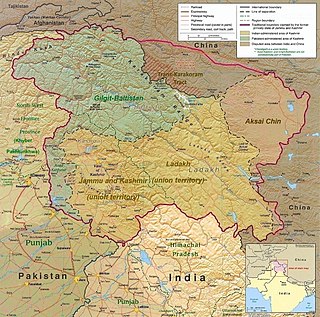
The Line of Control (LoC) is a military control line between the Indian- and Pakistani-controlled parts of the former princely state of Jammu and Kashmir—a line which does not constitute a legally recognized international boundary, but serves as the de facto border. It was established as part of the Simla Agreement at the end of the Indo-Pakistani War of 1971. Both nations agreed to rename the ceasefire line as the "Line of Control" and pledged to respect it without prejudice to their respective positions. Apart from minor details, the line is roughly the same as the original 1949 cease-fire line.

Lashkar-e-Taiba is a terrorist group formed in Pakistan, and a militant and Islamist Salafi jihadist organisation. Described as one of Pakistan's "most powerful jihadi groups", it is most infamous outside Pakistan. The organisation's primary stated objective is to merge the whole of Kashmir with Pakistan. It was founded in 1985–86 by Hafiz Saeed, Zafar Iqbal Shehbaz Abdullah Azzam and several other Islamist mujahideen with funding from Osama bin Laden during the Soviet–Afghan War. It has been designated a terrorist group by numerous countries.

The Kargil War, also known as the Kargil conflict,[note (I)] was fought between India and Pakistan from May to July 1999 in the Kargil district of Ladakh and elsewhere along the Line of Control (LoC). In India, the conflict is also referred to as Operation Vijay, which was the codename of the Indian military operation in the region. The Indian Air Force acted jointly with the Indian Army to flush out the Pakistan Army and paramilitary troops from vacated Indian positions along the LoC, in what was designated as Operation Safed Sagar.

Vidhu Vinod Chopra is an Indian film director, producer, screenwriter and editor. He is the recipient of several accolades, including four National Film Awards, ten Filmfare Awards and an Academy Award nomination. He is known for directing films such as the crime drama Parinda (1989), the patriotic romantic drama 1942: A Love Story (1994), the action drama Mission Kashmir (2000) and the biographical drama 12th Fail (2023). He is also known for producing the Munna Bhai film series, 3 Idiots (2009), PK (2014), and Sanju (2018) under his banner Vinod Chopra Films.

Ghulam Nabi Azad is an Indian politician who served as Leader of Opposition in Rajya Sabha between 2014 and 2021. He also served as the Chief Minister of erstwhile state of Jammu and Kashmir from 2005 to 2008. On 26 September 2022, Azad announced his own political party as Democratic Progressive Azad Party. He is the chief patron cum founder of Democratic Progressive Azad Party.
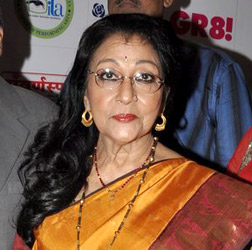
Alda Sinha, better known by her stage name Mala Sinha, is a former Indian actress who has worked in Hindi, Bengali and Nepali films. Initially starting her career with regional cinema, she went on to become a top leading actress in Hindi Cinema in the late 1950s, 1960s and early 1970s. In a career spanning four decades, Mala Sinha rose to prominence with films like Guru Dutt's Pyaasa (1957) and Yash Chopra's Dhool Ka Phool (1959). Later, she starred in over hundred film productions including Phir Subah Hogi (1958), Hariyali Aur Rasta, Anpadh, Dil Tera Deewana (1962), Gumrah, Bahurani, Himalay Ki God Mein (1965), Aasra (1966), Ankhen, Do Kaliyan, Maryada (1971). She was known as the "daring diva" and "torch bearer of women's cinema" for essaying strong female centric and unconventional roles in a range of movies considered ahead of their times. Having received multiple awards and nominations, she was given the Filmfare Lifetime Achievement Award in 2018.

The insurgency in Jammu and Kashmir, also known as the Kashmir insurgency, is an ongoing separatist militant insurgency against the Indian administration in Jammu and Kashmir, a territory constituting the southwestern portion of the larger geographical region of Kashmir, which has been the subject of a territorial dispute between India and Pakistan since 1947.
The 1998 Wandhama massacre refers to the killings of 23 Kashmiri Hindus in the town of Wandhama in the Ganderbal District of Jammu and Kashmir, India on 25 January, 1998. The massacre was blamed on the militant outfits Lashkar-e-Taiba and Hizbul Mujahideen. The victims included four children and nine women.
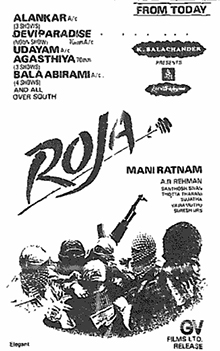
Roja (transl. Rose) is a 1992 Indian Tamil-language romantic thriller film co-written and directed by Mani Ratnam. The film stars Arvind Swamy and Madhoo, with the latter in the title role. It follows a simple girl from a village in Tamil Nadu, making desperate efforts to find her husband after he is kidnapped by militants during a secret undercover mission in Jammu and Kashmir.

Nidhi Razdan is an Indian journalist and television personality. She was the executive editor of NDTV and the primary anchor of NDTV 24x7 news debate show Left, Right & Centre, and the weekly debate show The Big Fight.

Gopalakrishnan Padmanabhan, better known by his stage name Dileep, is an Indian actor, producer, and businessman who predominantly works in the Malayalam film industry. He has acted in and Tamil, Hindi, films lead roles. One more Kannada film cameo role acted. and has won several awards, including four Kerala State Film Awards and one Filmfare Awards South.
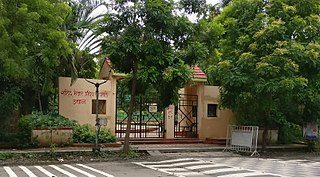
Shahid Major Pradeep Tathawade Udyan (or Major Tathawade Garden) is a public garden and a major landmark in Pune, Maharashtra, India. The garden was opened to the public on 31 October 2002 and is maintained by the Garden department of Pune Municipal Corporation.
Human rights abuses in Jammu and Kashmir range from mass killings, enforced disappearances, torture, rape and sexual abuse to political repression and suppression of freedom of speech. The Indian Army, Central Reserve Police Force (CRPF), and Border Security Personnel (BSF) have been accused of committing severe human rights abuses against Kashmiri civilians. According to Seema Kazi, militant groups have also been held responsible for similar crimes, but the vast majority of abuses have been perpetrated by the armed forces of the Indian government.

The Jammu–Sialkot line was a 43 km (27 mi) broad gauge branch of the North Western State Railway from Wazirabad Junction, Punjab, to Jammu, passing through the Sialkot Junction. The section from Sialkot to Jammu (Tawi) was 27 miles (43 km) long, partly in the British Indian province of Punjab and partly in the princely state of Jammu and Kashmir Built in 1890 during the reign of Maharaja Pratap Singh, it was the first railway line in the state of Jammu and Kashmir.
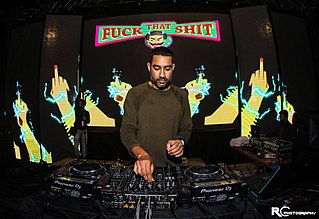
Udyan Sagar, better known by his stage name Nucleya, is an Indian electronic music producer.

Real Kashmir Football Club is an Indian professional football club based in Srinagar, Jammu and Kashmir. Incorporated in 2016, the club predominantly competes in I-League, the second tier of Indian football league system. Real Kashmir with its reserves side also participates in Jammu & Kashmir Premier Football League regionally.

Indian Army operations in Jammu and Kashmir include security operations such as Operation Rakshak, which began in 1990, Operation Sarp Vinash in 2003 and Operation Randori Behak in 2020. Other operations include humanitarian missions such as Operation Megh Rahat and operations with a social aim such as Operation Goodwill and Operation Calm Down. The Indian Army works in tandem with the other arms of the Indian Armed Forces and security forces in Jammu and Kashmir such as during Mission Sahayata or joint operations.

Media in Jammu and Kashmir comprises a diverse landscape of print, electronic and digital media outlets. The region is served by a variety of newspapers, television channels, radio stations, and online news platforms, reflecting the cultural and linguistic diversity of the area.

Jammu and Kashmir is a region administered by India as a union territory and consists of the southern portion of the larger Kashmir region, which has been the subject of a dispute between India and Pakistan since 1947 and between India and China since 1959. The Line of Control separates Jammu and Kashmir from the Pakistani-administered territories of Azad Kashmir and Gilgit-Baltistan in the west and north. It lies to the north of the Indian states of Himachal Pradesh and Punjab and to the west of Ladakh which is administered by India as a union territory.
















